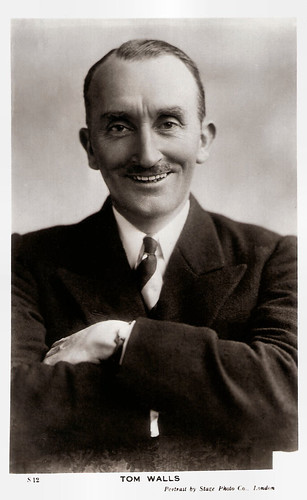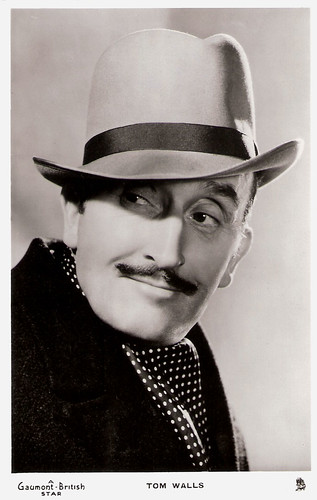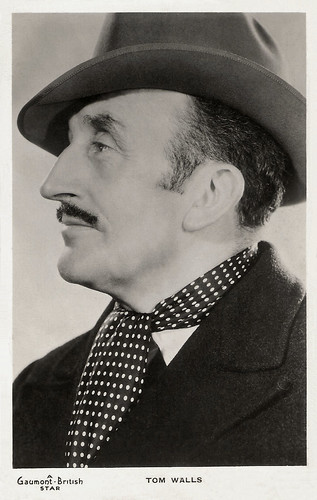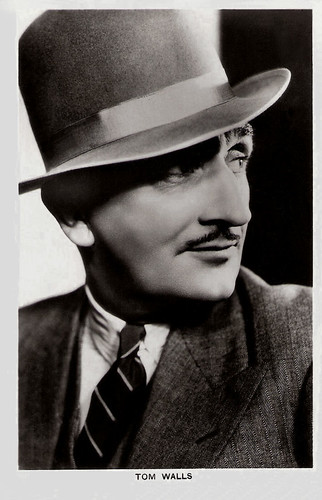English actor Tom Walls (1883-1949) was a popular character player on stage and in films and also worked as a film director. He is indelibly associated with the popular Aldwych Theatre farces of the 1920s and 1930s and was one of the most influential figures in British comedy.

British postcard by W & G Ltd., London, S12. Photo: Stage Photo Co., London.

British postcard by Real Photograph, no. 175. Photo: Capitol Films.

British postcard in the Film Weekly Series, London.

British postcard in the Film Weekly Series, London.
Tom Kirby Walls was born in Kingsthorpe, Northampton, England in 1883. He was the son of a plumber and was educated at Northampton County School.
After leaving school, he spent a year in Canada. On his return, he was he worked for a brief time as a busker (street entertainer), a jockey, and an officer in the Metropolitan Police Force. After these false starts, he settled on a stage career.
In 1905 he made his debut in the pantomime Aladdin in Glasgow. He toured America in 1906 and 1907 and on his return to England, he made his London debut at The Empire Theatre in 'Sir Roger de Coverley' (1907). He remained at the Empire (as well as touring) in musical comedy for the next two years.
By 1912 he was firmly established as a West End star. He had a principal role in the musical 'Kissing Time' (1919) and in 'Whirled into Happiness' (1922). In 1922, Walls also co-produced with Leslie Henson the farce 'Tons of Money' at the Shaftesbury Theatre. The farce, in which he also starred, ran for two years.
He made an early foray into the cinema co-producing the film version of Tons of Money (Frank Hall Crane, 1924), though he didn't reprise his role. For their next project, 'It Pays to Advertise', they moved to the Aldwych Theatre. Thus they inaugurated the Aldwych Farce series of comedies in which silly upper-class twits become entangled with inconvenient young ladies just as all the suspicious wives, battleaxe mothers-in-law, and henpecked husbands show up at once.
Gary Brumburgh at IMDb: “As the star and producer of a succession of witty spoofs typically denigrating society's upper crust, he often played the slick cad. Written expertly by Ben Travers and in tandem with fellow comic extraordinaires Ralph Lynn and Robertson Hare, the shows were chock full of sight gags, puns, double entendres, and slapstick.”
The Aldwych farces featured an ensemble cast that also included Leslie Henson, Yvonne Arnaud, Mary Brough, Winifred Shotter, Claude Hulbert, and others.

British "Real Photograph" postcard by Raphael Tuck & Sons, no. 93. Photo: Gaumont-British.

British postcard by Raphael Tuck & Sons in the Real Photograph series, no. 178. Photo: Gaumont-British.

British postcard by Raphael Tuck & Sons in the Real Photograph series, no. 94. Photo: Gaumont-British.
When the sound film arrived, Tom Walls moved his focus away from the theatre and into films. He functioned as both star and director in the first Aldwych-produced farce transferred to the cinema, Rookery Nook (Tom Walls, 1930) co-starring Ralph Lynn and Winifred Shotter. The madcap nonsense was a smash box-office success.
So several of their classic stage shows were filmed, including Plunder (Tom Walls, 1931), A Night Like This (Tom Walls, 1932), Thark (Tom Walls, 1932), Turkey Time (Tom Walls, 1933), A Cuckoo in the Nest (Tom Walls, 1933), Dirty Work (Tom Walls, 1934) and A Cup of Kindness (Tom Walls, 1934).
More or less all of them were presented as photographed plays. Walls directed seventeen films till 1938 and acted in most of them. In 1937 he and Ralph Lynn were voted the seventh most popular British stars by local exhibitors. He directed his last film towards the end of the 1930s, Old Iron (Tom Walls, 1938) with Eva Moore.
When the economics of the industry changed with the new Cinematography Act, Walls went back to the theatre. He returned to films as an actor only. His career waned in the following decade, but he was still seen in a number of films, both comedic and touchingly dramatic.
In the war film Undercover (Sergei Nolbandov, 1943), he played the father of a guerrilla resistance leader (John Clements) in Nazi-occupied Yugoslavia. Walls continued to act as a character actor until his death, essaying a variety of twinkle-eyed old scoundrels. His final film was the thriller The Interrupted Journey (Daniel Birt, 1949) starring Valerie Hobson.
His great passion outside of show business was horses. His productions had made him very rich and by 1927 he had his own racing stable. He moved to Ewell, Epsom, home of The Epsom Derby, and triumphed there in 1932 with his colt April the Fifth which he trained himself. In all, he trained about 150 winners (total wins) up until 1948. He was also a regular rider with his local foxhounds. However, this expensive hobby took its toll, and by the time of his death, he was insolvent.
At 66, Tom Walls passed away in 1949 in his home near Edwell, England. He was married to Hilary Edwards. With their son, Tom Walls Jr., he made two on-screen appearances, Spring in Park Lane (Herbert Wilcox, 1948) and Maytime in Mayfair (Herbert Wilcox, 1949), both starring Anna Neagle and Michael Wilding.

British postcard in the Picturegoer Series, London, no. 675.

British postcard by Real Photographs Co. Ltd., Southport. Photo: Columbia British. Tom Walls in This Man Is Mine (Marcel Varnel, 1946).

British postcard. With Ralph Lynn.

British postcard in the Picturegoer Series, London, no. W 418. Photo: Herbert Wilcox Production / British Lion. Publicity still for Spring in Park Lane (Herbert Wilcox, 1948) with Anna Neagle and Michael Wilding.
Sources: Hal Erickson (AllMovie), Gary Brumburgh (IMDb), David Absalom (British Pictures), Wikipedia, and IMDb.
This post was last updated on 3 January 2021.

British postcard by W & G Ltd., London, S12. Photo: Stage Photo Co., London.

British postcard by Real Photograph, no. 175. Photo: Capitol Films.

British postcard in the Film Weekly Series, London.

British postcard in the Film Weekly Series, London.
West End Star
Tom Kirby Walls was born in Kingsthorpe, Northampton, England in 1883. He was the son of a plumber and was educated at Northampton County School.
After leaving school, he spent a year in Canada. On his return, he was he worked for a brief time as a busker (street entertainer), a jockey, and an officer in the Metropolitan Police Force. After these false starts, he settled on a stage career.
In 1905 he made his debut in the pantomime Aladdin in Glasgow. He toured America in 1906 and 1907 and on his return to England, he made his London debut at The Empire Theatre in 'Sir Roger de Coverley' (1907). He remained at the Empire (as well as touring) in musical comedy for the next two years.
By 1912 he was firmly established as a West End star. He had a principal role in the musical 'Kissing Time' (1919) and in 'Whirled into Happiness' (1922). In 1922, Walls also co-produced with Leslie Henson the farce 'Tons of Money' at the Shaftesbury Theatre. The farce, in which he also starred, ran for two years.
He made an early foray into the cinema co-producing the film version of Tons of Money (Frank Hall Crane, 1924), though he didn't reprise his role. For their next project, 'It Pays to Advertise', they moved to the Aldwych Theatre. Thus they inaugurated the Aldwych Farce series of comedies in which silly upper-class twits become entangled with inconvenient young ladies just as all the suspicious wives, battleaxe mothers-in-law, and henpecked husbands show up at once.
Gary Brumburgh at IMDb: “As the star and producer of a succession of witty spoofs typically denigrating society's upper crust, he often played the slick cad. Written expertly by Ben Travers and in tandem with fellow comic extraordinaires Ralph Lynn and Robertson Hare, the shows were chock full of sight gags, puns, double entendres, and slapstick.”
The Aldwych farces featured an ensemble cast that also included Leslie Henson, Yvonne Arnaud, Mary Brough, Winifred Shotter, Claude Hulbert, and others.

British "Real Photograph" postcard by Raphael Tuck & Sons, no. 93. Photo: Gaumont-British.

British postcard by Raphael Tuck & Sons in the Real Photograph series, no. 178. Photo: Gaumont-British.

British postcard by Raphael Tuck & Sons in the Real Photograph series, no. 94. Photo: Gaumont-British.
Madcap Nonsense
When the sound film arrived, Tom Walls moved his focus away from the theatre and into films. He functioned as both star and director in the first Aldwych-produced farce transferred to the cinema, Rookery Nook (Tom Walls, 1930) co-starring Ralph Lynn and Winifred Shotter. The madcap nonsense was a smash box-office success.
So several of their classic stage shows were filmed, including Plunder (Tom Walls, 1931), A Night Like This (Tom Walls, 1932), Thark (Tom Walls, 1932), Turkey Time (Tom Walls, 1933), A Cuckoo in the Nest (Tom Walls, 1933), Dirty Work (Tom Walls, 1934) and A Cup of Kindness (Tom Walls, 1934).
More or less all of them were presented as photographed plays. Walls directed seventeen films till 1938 and acted in most of them. In 1937 he and Ralph Lynn were voted the seventh most popular British stars by local exhibitors. He directed his last film towards the end of the 1930s, Old Iron (Tom Walls, 1938) with Eva Moore.
When the economics of the industry changed with the new Cinematography Act, Walls went back to the theatre. He returned to films as an actor only. His career waned in the following decade, but he was still seen in a number of films, both comedic and touchingly dramatic.
In the war film Undercover (Sergei Nolbandov, 1943), he played the father of a guerrilla resistance leader (John Clements) in Nazi-occupied Yugoslavia. Walls continued to act as a character actor until his death, essaying a variety of twinkle-eyed old scoundrels. His final film was the thriller The Interrupted Journey (Daniel Birt, 1949) starring Valerie Hobson.
His great passion outside of show business was horses. His productions had made him very rich and by 1927 he had his own racing stable. He moved to Ewell, Epsom, home of The Epsom Derby, and triumphed there in 1932 with his colt April the Fifth which he trained himself. In all, he trained about 150 winners (total wins) up until 1948. He was also a regular rider with his local foxhounds. However, this expensive hobby took its toll, and by the time of his death, he was insolvent.
At 66, Tom Walls passed away in 1949 in his home near Edwell, England. He was married to Hilary Edwards. With their son, Tom Walls Jr., he made two on-screen appearances, Spring in Park Lane (Herbert Wilcox, 1948) and Maytime in Mayfair (Herbert Wilcox, 1949), both starring Anna Neagle and Michael Wilding.

British postcard in the Picturegoer Series, London, no. 675.

British postcard by Real Photographs Co. Ltd., Southport. Photo: Columbia British. Tom Walls in This Man Is Mine (Marcel Varnel, 1946).

British postcard. With Ralph Lynn.

British postcard in the Picturegoer Series, London, no. W 418. Photo: Herbert Wilcox Production / British Lion. Publicity still for Spring in Park Lane (Herbert Wilcox, 1948) with Anna Neagle and Michael Wilding.
Sources: Hal Erickson (AllMovie), Gary Brumburgh (IMDb), David Absalom (British Pictures), Wikipedia, and IMDb.
This post was last updated on 3 January 2021.
No comments:
Post a Comment